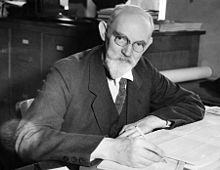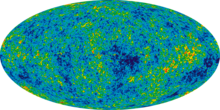Willem de Sitter
This article needs additional citations for verification. (September 2022) |
Willem de Sitter | |
|---|---|
 | |
| Born | 6 May 1872 |
| Died | 20 November 1934 (aged 62) Leiden, South Holland, Netherlands |
| Nationality | Dutch |
| Alma mater | Groningen University |
| Known for | de Sitter Universe |
| Scientific career | |
| Fields | Physics |
| Doctoral advisor | Jacobus Kapteyn[1] |
| Doctoral students | Dirk Brouwer Willem Hendrik van den Bos |
| Signature | |
 | |
| Part of a series on |
| Physical cosmology |
|---|
 |
Willem de Sitter (6 May 1872 – 20 November 1934) was a Dutch mathematician, physicist, and astronomer.
Life and work
[edit]Born in Sneek, de Sitter studied mathematics at the University of Groningen and then joined the Groningen astronomical laboratory. He worked at the Cape Observatory in South Africa (1897–1899). Then, in 1908, de Sitter was appointed to the chair of astronomy at Leiden University. He was director of the Leiden Observatory from 1919 until his death.
De Sitter made major contributions to the field of physical cosmology. He co-authored a paper with Albert Einstein in 1932 in which they discussed the implications of cosmological data for the curvature of the universe. He also came up with the concept of the de Sitter space and de Sitter universe, a solution for Einstein's general relativity in which there is no matter and a positive cosmological constant. This results in an exponentially expanding, empty universe. De Sitter was also well-known for his research on the motions of the moons of Jupiter, invited to give the George Darwin Lecture at the Royal Astronomical Society in 1931.[2]
Willem de Sitter died after a brief illness in November 1934.[3][4][5]
Honours
[edit]In 1912, he became a member of the Royal Netherlands Academy of Arts and Sciences.[6]
Awards
[edit]- James Craig Watson Medal (1929)
- Bruce Medal (1931)
- Gold Medal of the Royal Astronomical Society (1931)
- Prix Jules Janssen, the highest award of the Société astronomique de France, the French astronomical society (1934)
Named after him
[edit]- The crater De Sitter on the Moon
- Asteroid 1686 De Sitter
- De Sitter universe
- De Sitter space
- Anti-de Sitter space
- De Sitter invariant special relativity
- Einstein–de Sitter universe
- De Sitter double star experiment
- De Sitter precession
- De Sitter–Schwarzschild metric
Family
[edit]One of his sons, Ulbo de Sitter (1902 – 1980), was a Dutch geologist, and one of Ulbo's sons was a Dutch sociologist Ulbo de Sitter (1930 – 2010).
Another son of Willem, Aernout de Sitter (1905 – 15 September 1944[7]), was the director of the Bosscha Observatory in Lembang, Indonesia (then the Dutch East Indies), where he studied the Messier 4 globular cluster.
Selected publications
[edit]
- De Sitter, W. (1911). . Monthly Notices of the Royal Astronomical Society. 71 (5): 388–415. doi:10.1093/mnras/71.5.388. hdl:2027/mdp.39015019246357.
- De Sitter, W. (1913). . Proceedings of the Royal Netherlands Academy of Arts and Sciences. 15 (II): 1297–1298. Bibcode:1913KNAB...15.1297D.
- [An astronomical proof of the constancy of the speed of light]. Physikalische Zeitschrift. 14: 429. 1913.
- . Proceedings of the Royal Netherlands Academy of Arts and Sciences. 16 (I): 395–396. 1913.
- De Sitter, W. (1913). [On the accuracy within which the independence of the speed of light from the motion of the source can be asserted]. Physikalische Zeitschrift. 14: 1267. Bibcode:1913PhyZ...14.1267D.
- On Einstein's theory of gravitation and its astronomical consequences:
- De Sitter, W. (1916-07-14). "On Einstein's Theory of Gravitation and its Astronomical Consequences. First Paper". Monthly Notices of the Royal Astronomical Society. 76 (9): 699–728. Bibcode:1916MNRAS..76..699D. doi:10.1093/mnras/76.9.699. ISSN 0035-8711 – via Oxford University Press.
- De Sitter, W. (1916-12-08). "On Einstein's Theory of Gravitation and its Astronomical Consequences. Second Paper". Monthly Notices of the Royal Astronomical Society. 77 (2): 155–184. Bibcode:1916MNRAS..77..155D. doi:10.1093/mnras/77.2.155. ISSN 0035-8711 – via Oxford University Press.
- De Sitter, W. (1917-11-09). "On Einstein's Theory of Gravitation and its Astronomical Consequences. Third Paper". Monthly Notices of the Royal Astronomical Society. 78 (1): 3–28. Bibcode:1917MNRAS..78....3D. doi:10.1093/mnras/78.1.3. ISSN 0035-8711 – via Oxford University Press.
See also
[edit]- De Sitter double star experiment
- De Sitter precession
- De Sitter relativity
- De Sitter space
- De Sitter universe
- Anti-de Sitter space
- The Dreams in the Witch House, a story by H. P. Lovecraft featuring de Sitter, and inspired by his lecture The Size of the Universe
References
[edit]- ^ Willem de Sitter at the Mathematics Genealogy Project
- ^ de Sitter, Willem (1931). "Jupiter's Galilean satellites (George Darwin Lecture)". Monthly Notices of the Royal Astronomical Society. 91: 706–738. Bibcode:1931MNRAS..91..706D. doi:10.1093/mnras/91.7.706.
- ^ Obituary Notes of Astronomers at www.astro.uni-bonn.de
- ^ 1947BAN....10..287D Page 287 at articles.adsabs.harvard.edu
- ^ Adriaan, Blaauw (2004). "My Cruise Through the World of Astronomy". Annual Review of Astronomy and Astrophysics. 42 (1): 1–37. Bibcode:2004ARA&A..42....1B. doi:10.1146/annurev.astro.42.053102.134020.
- ^ "Willem de Sitter (1872 - 1934)". Royal Netherlands Academy of Arts and Sciences. Retrieved 19 July 2015.
- ^ Obituary Notes of Astronomers at www.astro.uni-bonn.de
External links
[edit]- O'Connor, John J.; Robertson, Edmund F., "Willem de Sitter", MacTutor History of Mathematics Archive, University of St Andrews
- P.C. van der Kruit Willem de Sitter (1872 – 1934) in: History of science and scholarship in the Netherlands.
- A. Blaauw, Sitter, Willem de (1872–1934), in Biografisch Woordenboek van Nederland.
- Bruce Medal page
- Awarding of Bruce Medal: PASP 43 (1931) 125
- Awarding of RAS gold medal: MNRAS 91 (1931) 422
- de Sitter's binary star arguments against Ritz's relativity theory (1913) Archived 2009-01-29 at the Wayback Machine (four articles)
Obituaries
[edit]- AN 253 (1934) 495/496 (one line)
- JRASC 29 (1935) 1
- MNRAS 95 (1935) 343
- Obs 58 (1935) 22
- PASP 46 (1934) 368 (one paragraph)
- PASP 47 (1935) 65
- 1872 births
- 1934 deaths
- 19th-century Dutch astronomers
- 19th-century Dutch mathematicians
- 20th-century Dutch astronomers
- Dutch relativity theorists
- 20th-century Dutch mathematicians
- Cosmologists
- People from Sneek
- Academic staff of Leiden University
- University of Groningen alumni
- Members of the Royal Netherlands Academy of Arts and Sciences
- Foreign associates of the National Academy of Sciences
- Recipients of the Gold Medal of the Royal Astronomical Society
- Presidents of the International Astronomical Union
